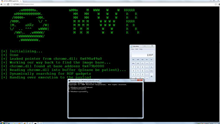Web browsers Google Chrome, Internet Explorer and Firefox along with Windows 8 and Java have been exploited in the Pwn2Own hacking contest in Canada today.
Each attack at the CanSecWest competition used zero-day vulnerabilities on a fully patched Windows 7, 8 and OS X Mountain Lion operating system with default configurations.
Firefox was popped with a use-after-free vulnerability and a new technique that bypasses Address Space Layout Randomisation (ASLR) and Data Execution Prevention (DEP) in Windows, Vupen said.
Windows 8 also fell to the security consultancy which cracked Microsoft's Surface Pro using two Internet Explorer zero day vulnerabilities and a sandbox bypass.
Java was also fell to Accuvant Labs' Josh Drake, Contextis' James Forshaw and Vupen which broke the platform by finding a heap overflow.
MWRLabs researchers Nils and Jon Butler chalked up a reliable sandbox bypass exploit against zero day vulnerabilities in Chrome. The attack was made by pointing the browser running on an updated Windows operating system to a malicious webpage which granted code execution in the sandboxed renderer process.
The pair also found a kernel vulnerability that granted elevated privileges arbitrary commands execution outside of the sandbox with system privileges.
"We were able to exploit the first vulnerability in multiple ways, allowing us to leak the addresses of several objects in memory, calculate the base address of certain system dlls, read arbitrary data, and gain code execution," the company said.
This allowed us to bypass ALSR by leaking the base address of a dll, and to bypass DEP by reading that dll's .text segment into a javascript string, allowing us to dynamically calculate the addresses of Return-Oriented Programming (ROP) gadgets."
Google shored up Chrome's defences in the lead up to the hacking contest with 10 patches that addressed six high severity flaws.
More than half a million dollar was up for grabs in the competition. Researchers could earn $100,000 for popping Chrome on Windows 7; the same for hacking Internet Explorer 10 on Win 8; $75,000 for ripping up IE9 on Win 7; $60,000 for owning Firefox on Win 7; and $65,000 for exploiting Apple Safari on OS X Mountain Lion.
Owning IE9 plug-ins on Win 7 attracted $70,000 for Adobe Reader XI, $70,000 for Adobe Flash and $20,000 for Java.
Google will offer a whopping $3,14159 (PI million) at the sister Pwnium contest which runs alongside Pwn2Own. The attacks will occur on a WiFi Samsung Series 5 550 Chromebook running an updated stable version of Chrome OS.
The cash pool will be divided into $110,000 for a browser or system level compromise in guest mode or as a logged-in user, delivered via a web page; and $150,000 for a compromise with device persistence - guest to guest with interim reboot, delivered via a web page.
Exploit techniques and bugs were responsibly disclosed to affected vendors.





.jpg&h=142&w=230&c=1&s=1)



.png&h=142&w=230&c=1&s=1)



.jpg&w=100&c=1&s=0)
_(8).jpg&w=100&c=1&s=0)











